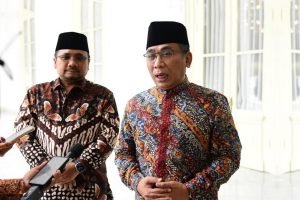Lainnya
Jakarta – Amelia Hapsari, Program Director of the non-profit documentary institute In-Docs, was chosen to be a member of the Academy of Motion Picture Arts and Sciences which holds the Oscars.
Her work at In-Docs, which actively organizes workshop forums with international mentors and Southeast Asian documentary filmmakers, paved her way to become an Oscar jury.
In-Docs, supported by the Creative Economy Agency since 2017, has held a global forum to liaise Indonesian and Southeast Asian documentary filmmakers with international film industry and investors in Docs By The Sea.
In the forum, documentary film projects were presented to donor agencies, television networks, distributors and world platforms that needed documentary films.
It is hoped that decision makers from prestigious institutions can find films from Southeast Asia to enrich documentary shows on their platforms with fresh talents and perspectives.
Amelia’s performance in In-Docs led Academy members who enter the world documentary film industry network to recommend her to be part of the Academy of Motion Pictures Arts and Sciences.
“Because I am the director of In-Docs, they see my work to bring Asian documentaries to the world. They feel that people like this should enter the Academy because they can bring diversity to the Oscar competition,” said Amelia, Friday.
“Within the international documentary industry itself, there are many progressive individuals who feel we must bring voices from the third world to the international level,” she continued.
This moment is very appropriate. While Amelia and her colleagues are trying to make the documentary films of Indonesia and Southeast Asia reach more broadly, the international world is also improving itself to increase diversity.
Amelia just found out she was part of the Academy of Motion Picture Arts and Sciences from the people who recommended it. She did not know that the profile requested by her colleague some time ago was in fact used for recommendations to enter the Academy.
“The person who recommended me sent an email after the announcement, he said, ‘hahaha, you don’t know, why did I ask for your profile at that time’. I don’t know,” Amelia said then laughed.
For her, this is an honor. But it’s still too early to be too proud. Her feelings are mixed. Because the journey of the documentary film to be a host in their own country is still quite long.
Amelia wants to send a message to the audience and stakeholders, in this case the government and the video on demand platform, that the notion of a documentary is not of great value is wrong.
“Very ironic because in the international world they have an industry, the filmmakers can also make a living from documentary films, not considered non-professional, ‘oh you are a documentary film maker’ as if it was a side, just a hobby.”
In the last few years, Amelia assessed that there are a number of Indonesian documentary film talents that can be developed and accepted abroad, even though the numbers are still too small.
“There must be more, support and ecosystems must be built more,” he said.
Amelia’s presence as part of the Academy will not necessarily guarantee Indonesian films can enter the prestigious arena in the near future.
However, she certainly will use her voice to choose a film that is truly worthy to be able to enter the competition and win.
“I hope that later I can underline a film that actually shows the diversity of expression,” she said.
Documentary Attraction
The woman who graduated from Ohio University who had been a radio journalist in China and worked in a non-profit East Timor production house explained the appeal of documentary films.
Documentary films can make viewers enter the reality conveyed by filmmakers.
“Even though reality is complex, we can share it, bring us to a new perspective.”
According to her, documentary films are a powerful and important medium to make the public more critical and reflect on what is happening.
She has made a series of films, including “The Heroes and The Land” (2001), “Sharing Paradise” (2005), “Weaving Stories” (2010), “The Youth Parliament” (2011), “Jadi Jagoan ala Ahok” ( 2012) and “Akar” (2013).
She also became the producer of “Rising from Silence” who won the Citra Cup for the best 2018 short documentary category.
“Since 2015 I have rarely made films because the task at In-Docs is to make the ecosystem so that these films are more connected, more impactful,” said Amelia, who now wants to focus on making the documentary film ecosystem more conducive.
Recently, the COVID-19 pandemic led her to hold IF / Then programs, workshops and pitching forums with the Tribeca Film Institute virtually.
On the one hand, more people can attend because there is no distance. On the other hand, interactions to build networks and exchange ideas cannot be as flexible as meeting face-to-face.
“At least it still exists, if it is canceled altogether, many films will be canceled and make people suffer huge losses,” she said. (Ant)
English by Tokoh.ID System











